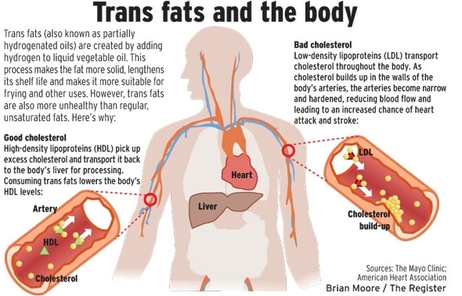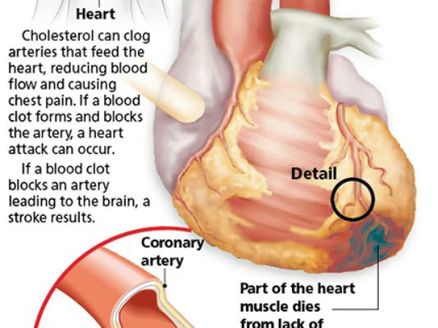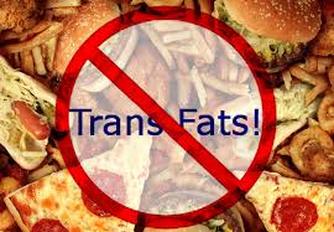 The US Food and Drug Administration announced their will be a ban on trans-fats by 2016 because they are consider unsafe and cause fatal heart attacks. Doctors say trans-fats are the worst type of fat you can eat. Trans-fat raises your LDL (bad) cholesterol and lowers your HDL (good or healthy) cholesterol. When a high LDL cholesterol is combined with a low HDL, your risk of heart disease increases and is the leading killer of men and women, according to the Mayo Clinic. What is a trans fat? Some meat and dairy products contain small amounts of naturally occurring trans fat. But most trans fat is formed through an industrial process that adds hydrogen to vegetable oil, which causes the oil to become solid at room temperature. This partially hydrogenated oil is less likely to spoil, so foods made with it have a longer shelf life. Some restaurants use partially hydrogenated vegetable oil (PHOs) in their deep fryers, because it doesn't have to be changed as often as do other oils. A 2016 ban would save lives by preventing fatal heart attacks, according to the FDA. Food suppliers have been required to show trans-fats information on food labels since 2006 but health experts say Americans still consume too much. "The FDA's action on this major source of artificial trans-fat demonstrates the agency's commitment to the heart health of all Americans," said FDA's Acting Commissioner Stephen Ostroff. "This action is expected to reduce coronary heart disease and prevent thousands of fatal heart attacks every year." Trans-fats facts
 Since the FDA started labeling trans-fats, the agency estimates that consumption of them decreased by 78% in the US. The UK has been calling for a ban on trans-fats for several years. In Denmark, almost all trans-fats have been banned since 2003. The Mayo Clinic defines trans-fat in your food as follows: · Baked goods. Most cakes, cookies, pie crusts and crackers contain shortening, which is usually made from partially hydrogenated vegetable oil. Ready-made frosting is another source of trans fat. · Snacks. Potato, corn and tortilla chips often contain trans fat. And while popcorn can be a healthy snack, many types of packaged or microwave popcorn use trans fat to help cook or flavor the popcorn. · Fried food. Foods that require deep frying — french fries, doughnuts and fried chicken — can contain trans fat from the oil used in the cooking process. · Refrigerator dough. Products such as canned biscuits and cinnamon rolls often contain trans fat, as do frozen pizza crusts. · Creamer and margarine. Nondairy coffee creamer and stick margarines also may contain partially hydrogenated vegetable oils. The list of foods to be affected by the ban is significant, but home cooking and baking is going to be affected as the use of PHOs in baking has been used in many recipes, particularly those requiring the use of shortening. Hundreds, perhaps thousands, of recipe books include the use of PHOs. Home cooks will need to begin making adjustments in recipes to replace shortening. Resources http://www.bbc.com/news/world-us-canada-33154168 http://www.mayoclinic.org/diseases-conditions/high-blood-cholesterol/in-depth/trans-fat/art-20046114
4 Comments
eileen
18/6/2015 01:36:11 am
A ban is way overdue in the UK Dava. Here cheap ice cream is often nothing more than heavily whipped cheap margarine laden with health negatives. No wonder we are a modern nation of fatties :(
Reply
Dava Castillo
18/6/2015 09:20:54 am
Thank you for reading and commenting Eileen.
Reply
Eileen
18/6/2015 10:42:41 am
I don't know about in the USA but here these days food labelling says if trans fatty acids are in a product and how much etc. A bit of a farce when you consider we had rogue horse meat where it was supposed to beef but at least it helps.
Dava Castillo
19/6/2015 12:32:04 pm
Eileen,
Reply
Leave a Reply. |
Dava Castillo
is retired and lives in Clearlake, California. She has three grown
children and one grandson and a Bachelor’s degree in Health Services
Administration from St. Mary’s College in Moraga California. On the
home front Dava enjoys time with her family, reading, gardening, cooking
and sewing. Archives
November 2015
|


